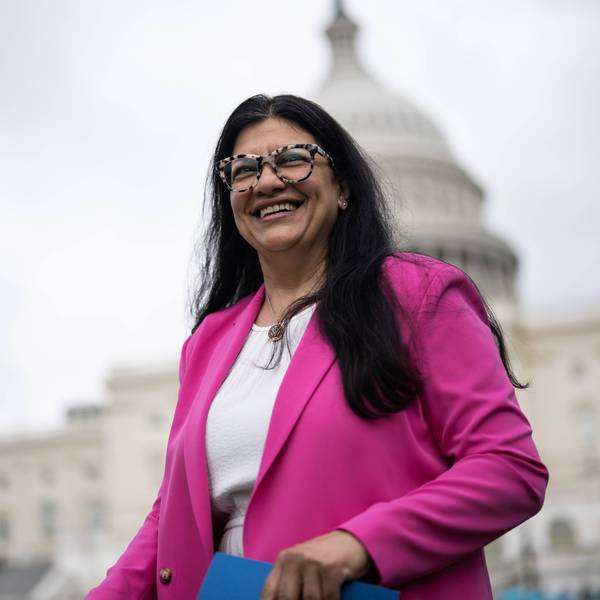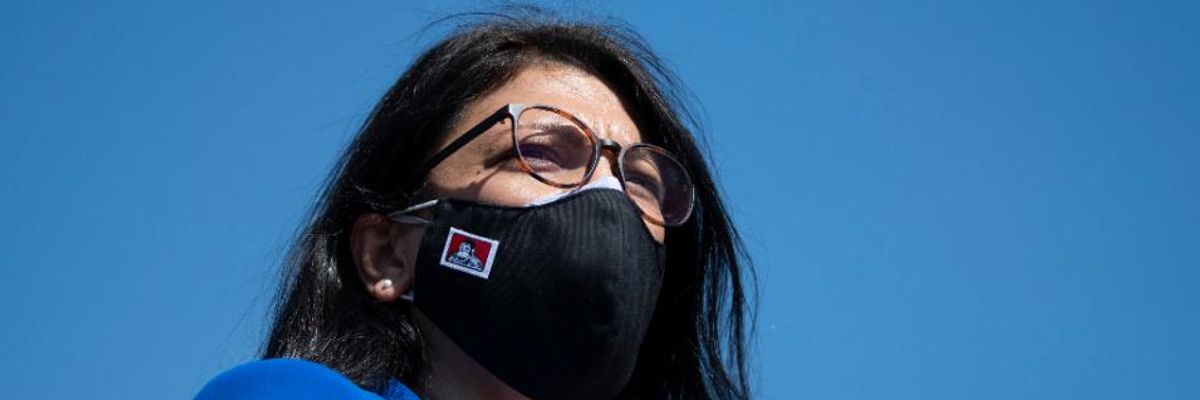Democratic Reps. Rashida Tlaib and Pramila Jayapal on Tuesday introduced legislation that would provide everyone in the U.S. with $2,000 monthly payments during the coronavirus crisis and $1,000 per month for a year after the emergency ends in an effort to guarantee sustained relief for millions struggling to afford food, rent, and other basic expenses amid the pandemic.
"In the last year of this global pandemic, we have seen corporations and CEOs reap the benefits of payouts and soaring profits while everyday workers, low-income people,and families across the country have been left to scrape by without any recurring, aggressive, and inclusive financial assistance from our federal government," said Tlaib. "Folks need far more aid."
"People don't only need relief, they need stability, certainty, and predictability, and the ABC Act delivers them exactly that."
--Rep. Pramila Jayapal
The Automatic BOOST to Communities (ABC) Act proposes financing the payments with an unconventional plan that would direct the Treasury Department to use its legal authority to mint as many $1 trillion platinum coins as necessary to fund the legislation, which would continue until a year after the public health emergency ends or the unemployment rate stabilizes at a low level.
The idea of using the U.S. Mint to cover government costs rose to prominence in 2011 during a fight over the debt ceiling and briefly emerged once again in 2013. As Matthew O'Brien explained in The Atlantic at the time, federal law "lets the Treasury create coins in whatever value it wants, even $1 trillion."
"It's all straightforward enough," O'Brien wrote. "The Treasury would create one of these coins, deposit it at the Federal Reserve, and use the new money in its account to pay our bills."
Tlaib's office presents the proposed financing mechanism as a way to assuage the fears of debt mongers concerned about the price tag of sending recurring payments to everyone in the U.S. Funding the bill by having the Treasury mint trillion-dollar coins would mean "no additional debt," according to the Michigan Democrat, who has a website devoted to explaining the idea.
Jayapal, the chair of the Congressional Progressive Caucus, said in a statement Tuesday that "this unprecedented moment demands an unprecedented response."
"People don't only need relief, they need stability, certainty, and predictability, and the ABC Act delivers them exactly that," Jayapal continued. "Our legislation acknowledges that a one-time survival check isn't enough to get people through this crisis. Instead, we send out recurring checks every month during the crisis and for a year after it ends. That is money in people's pockets, and certainty in their lives."
Tlaib and Jayapal's bill comes as one-time direct payments approved under the recently passed American Rescue Plan (ARP) continue to land in people's bank accounts and arrive in the mail in check form.
Unlike the ARP, which restricts eligibility for the payments based on income, the ABC Act calls for universal direct payments to ensure that no one in need of financial assistance is left behind.
To guarantee that everyone would benefit, the ABC Act proposes the creation of an "emergency responder corps to be deployed to vulnerable communities to ensure they have access to the direct payments and other needed resources," according to Tlaib's office. The payments would be distributed through direct deposit or debit cards issued by the Treasury Department.
"The ABC Act would provide the type of relief at the scale and consistency that people actually need," Maurice Mitchell, national director of the Working Families Party, said in a statement. "This is a transformational piece of legislation and it has our full support."
This article has been corrected to reflect that the bill would provide $2,000 per month during the coronavirus crisis and $1,000 per month after the crisis ends.




